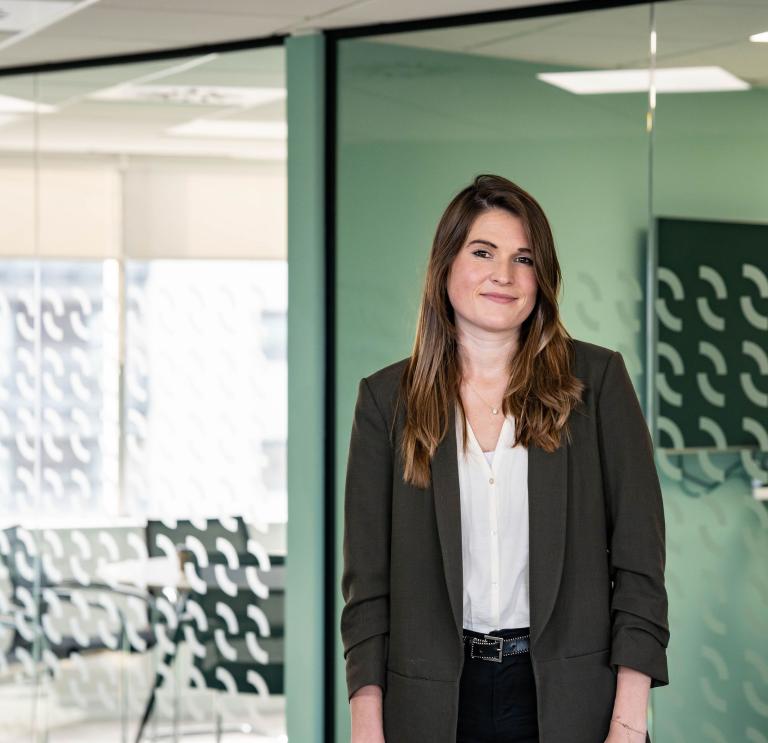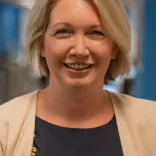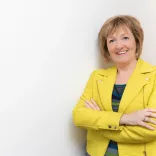How did you get into the industry?
Following completion of a Master’s degree in Mathematics at Oxford University, I wanted a job that would actually enable me to use my Maths degree, so I chose to pursue an Actuarial career in Insurance, which is a fairly typical route for a mathematician. As part of my role there, I was able to move my life and career to Paris where I lived for four years – running predictive analytics projects mainly in Europe, but also in Asia. This is how I fell in love with the field of data science.
On a trip to Wales, I was fortunate to hear Anne Boden, Founder and CEO of Starling Bank speaking on BBC Radio Wales for Internationals Women’s Day. Anne’s interview was so inspiring - she discussed the topic of Women in Technology and FinTech, focusing on how she would love to see more women involved in these areas. I was so inspired that I wrote to Anne asking about opportunities at Starling - the rest is history, I’ve been at Starling ever since!
Can you describe a key decision or ‘fork in the road’ that had a big impact on your career?
The ‘fork in the road’ for me was hearing Anne on BBC Radio Wales. I was so inspired - I knew I had to know more about FinTech and the work that was being done. It’s for this reason that I believe it’s important for Women who have successfully transitioned into these areas to speak about their experiences - if we can each inspire just one woman to make a similar transition, it’s worth it!
What do you love about working in FinTech?
I enjoy the feeling that we are doing something that has not been done before. Banking has felt ‘the same’ since I can remember- it was time for change, and we are working together towards that. The progress that has been made over the last 5 years is incredible - the attitudes of customers have changed, they expect more from us and the Banking industry as a whole, and so they should.
How did you become aware of the opportunities within the sector in Wales?
I have always been acutely aware of the prevalence of an emerging tech and analytics scene in Wales. Whilst working in the insurance space I was required to work with several of the price comparison companies that were based in Wales and I was proud that Wales was a leader in this area. I also took many of the actuarial qualifying exams in the Cardiff centre so I would regularly meet other aspiring actuaries as part of the examination process.
Who were your role models as you progressed in the industry?
In moving to Starling, I found role models in so many of my colleagues in unexpected ways. The energy and commitment that the entire Starling team puts into delivering the best customer experiences is infectious - and it was this collective energy that motivated me to throw myself head first into the industry.
What would you tell your 18 year old self?
I would tell my 18 year old self not to worry so much about the choices you make when still in school or in the early years of University. There is a lot of pressure to ‘know what you want to do’ and ‘think ahead’ to when you graduate. In pursuing a Mathematics degree, I knew I was pursuing a field that I found genuinely interesting and had a natural aptitude towards. My words of advice would be to keep your options open, always be eager to learn and don’t be afraid to grasp opportunities with both hands - especially when they push you out of your comfort zone.
What are the biggest challenges that it’s seen off so far? As an industry, what’s been learned from such challenges?
For a long time, UK Fintech felt centered inside the M25 - This was a challenge that I feel has now been overcome. Regional hotspots of Fintech have emerged and have developed at speed into rich hubs of talent and innovation. Fintech in Wales has emerged as one such hub, and in overcoming this initial challenge I fully expect Fintech talent in Wales to flourish and evolve.
There are a number of women in key senior roles in FinTech in Wales – why do you think that is?
I mentioned above that working in Fintech is so exciting because it feels like we are doing things differently to how they were done before. For too long big banks were run by middle aged white men - today Fintech is changing this norm and I’m proud that Welsh women are so prominent in this evolution.
What are the biggest changes you’ve seen in the industry during your time?
The Covid-19 pandemic changed daily life for all of us - but for Fintech, it was an opportunity to step up and show customers that we could be there for them when they needed us most. Humans are naturally cautious about change, especially when it comes to their finances, but the pandemic has demonstrated how fintech solutions were able to support businesses and retail customers when traditional banks were unable to operate as normal.
What’s the opportunity for the sector?
There has been so much change over the last 5 years, but it still feels like we are just getting started. Now that Wales is established as a regional hub for talent and innovation in Fintech there is much potential for Wales to become a Fintech destination in it’s own right.
Where should we focus our energies, and what is the road map to get there?
Capturing the attention of young talent in Wales will be key to the next phase of this journey. It’s no longer the case that talent needs to be trained elsewhere to return to Wales - there are a wealth of expertise already here that should encourage and welcome school leavers, graduates & apprentices at the earliest opportunity to retain this talent and grow the Welsh Fintech scene from the ground up.
Where do you see Welsh FinTech in 5 years? 10 years?
I expect to see Welsh Fintech play an integral part in the overall evolution and growth of Fintech across the UK, and indeed globally over the course of the next 10 years. The collaborative nature of the Fintech industry is key to it’s success - after all we are all working together to achieve the same global goal, which is to improve the financial lives of customers using technology.
Biog: Prior to joining Starling, Harriet’s career was focused on bringing applications of AI to traditional regulated insurance markets in Europe and Asia. Since joining Starling, Harriet has led the data analytics agenda at the bank and is responsible for research into AI bias and Starling’s assurance of its own algorithms. Harriet sits on the AI Public Private Forum with the FCA and Bank of England, which aims to better understand the use and impact of AI/ML in Financial Services and support safe adoption of these technologies. In addition, in 2020 Harriet was recognised on the Innovate Finance Powerlist in recognition of her work in these fields.




